Early Years - East Central Journal - Ada News - Denison Herald - Farmer Stockman - Daily Oklahoman - Books - Awards and Memberships - Miscellaneous - Retirement and Beyond - Photo Gallery

The Farmer-Stockman
1937-1986
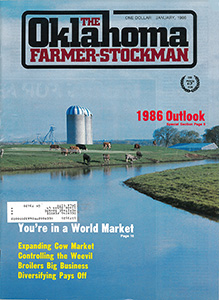
Newspaper clippings are Copyright by the Oklahoma Publishing Company or The Ada News
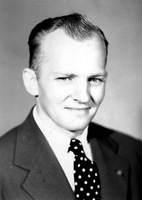
As editor, Ferdie Deering took an active interest in numerous agricultural and civic affairs. He served for more than 10 years as chairman of the Oklahoma City Chamber of Commerce Agriculture and Livestock Division, two years as vice president of the Chamber, and worked on numerous other committees. He helped to organize and served as president of the Sirloin Club of Oklahoma and the Oklahoma City Farm Club. He was an original member and chairman of the Oklahoma State University Agricultural Advisory Committee, and from 1956 through 1960 was a member of the Southern Regional Education Board's Commission for Advancement of Agricultural Sciences. He was one of the organizers of The Southwest American Livestock Foundation, and the Oklahoma Farm Bureau.
In addition, he was one of the incorporators of the Oklahoma Wheat Research Foundation, and in 1955 served as vice president on a committee headed by Governor Roy J. Turner that was successful in establishing the National Cowboy Hall of Fame and Western Heritage Center at Oklahoma City. He served on the Board of Directors of the University of Oklahoma Research Institute and was a member of the Board of Governors of Baptist Memorial Hospital at Oklahoma City.
He personally interviewed all Secretaries of Agriculture since the time of Henry A. Wallace in the 1930's to Earl Butz in the 1970's, and is the author of a book published by the University of Oklahoma Press concerning the United States Department of Agriculture (USDA) in 1945, which lead to the establishment of USDA Service Centers in rural communities starting in 1973. He served on state agricultural groups under four Oklahoma governors, having been appointed to the State Water Study Committee by Governor Raymond Gary in 1955, the the Governor's Advisory Council for Agricultural Development by Governor Henry Bellmon in 1963, to the Task Force Committee for Industrial Development by Governor Dewey Bartlett in 1968, and served as Chairman of the Weather Modification Study Committee to Governor David Hall in 1971.
He was president of the American Agricultural Editors Association in 1951, and received numerous awards from cattlemen, conservation associations, farm groups, youth organizations, the Freedom Foundation at Valley Forge, and universities in recognition of his contribution to agricultural progress. Working with Oklahoma A & M College (now Oklahoma State University), he helped form the first flying farmer group in the country as the Oklahoma Flying Farmers in 1943 and 1944. Later he helped Texas A & M College organize the Texas Flying Farmers. The movement had by then caught on in other states and soon the National Flying Farmers came into being with its first headquarters at Stillwater, Oklahoma, and subsequently evolved into the International Flying Farmers.
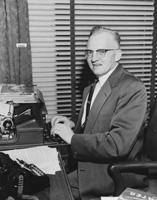
He also launched the Rural Neighborhood Progress Contest as a project of The Farmer-Stockman in 1947. Operated in co-operation with the Extension services of Oklahoma A&M College and Texas A&M College, this program developed into an influential campaign for better farming and higher standards of living in rural areas. Hundreds of rural communities in both Texas and Oklahoma made substantial and lasting progress, encouraged and sponsored by The Farmer-Stockman through this contest, which was conducted over a period of 12 years.
In 1972, he was among a group of employees that bought the Farmer-Stockman from OPUBCO, becoming Vice President and Editorial Director. The new Editor was Earnest Shiner, who had been with the magazine for many years serving as the Oklahoma Editor. OPUBCO bought back controlling interest in the Farmer-Stockman in 1979 and eventually sold it to the Nebraska Farmer in 1986. Since then agricultural publications have consolidated across the country and are owned by only a few parent companies today. The Farmer-Stockman has now merged with Southwest Farm Press, which is owned by Farm Progress (2017).
 |
This is a complete example of a
Farmer-Stockman Magazine. Although the size and format
changed over the 100+ years of publication, this is a typical example
under Ferdie Deering's editorship. The Farmer-Stockman July 1957 |
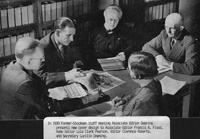 1939 Farmer-Stockman Staff Meeting |
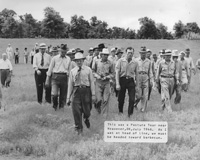 1946 Farmer-Stockman Pasture Tour |
.jpg) 1950 Farmer-Stockman Staff Dallas, Texas |
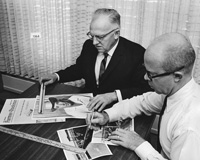 1964 Farmer-Stockman Working on Layout |
